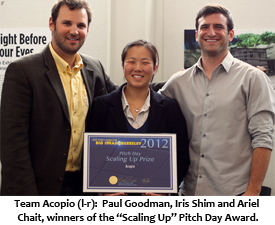 In the Rorya region of Tanzania, there is one doctor for every 30,000 people—the near equivalent of a single doctor for the entire UC Berkeley student population. With this kind of ratio, the delivery of emergency medical services to surrounding villages is not an easy task. The maternal mortality rate in this region is among the highest in the world—529 deaths for every 100,000 live births, which is 32 percent higher than the world average, according to the World Health Organization. Due to a lack of infrastructure for emergency transportation, mothers experiencing complications during or after childbirth have no way of receiving critical care.Two years ago, as a Global Poverty and Practice Minor fellow, Nicholas Hu and his colleague Sara Adelman traveled to Tanzania’s Rorya region, where they witnessed the dire consequences of this situation first-hand.
In the Rorya region of Tanzania, there is one doctor for every 30,000 people—the near equivalent of a single doctor for the entire UC Berkeley student population. With this kind of ratio, the delivery of emergency medical services to surrounding villages is not an easy task. The maternal mortality rate in this region is among the highest in the world—529 deaths for every 100,000 live births, which is 32 percent higher than the world average, according to the World Health Organization. Due to a lack of infrastructure for emergency transportation, mothers experiencing complications during or after childbirth have no way of receiving critical care.Two years ago, as a Global Poverty and Practice Minor fellow, Nicholas Hu and his colleague Sara Adelman traveled to Tanzania’s Rorya region, where they witnessed the dire consequences of this situation first-hand.
Working in the Shirati KMT Hospital, Nicholas recalls the story of a woman who experienced post-partum hemorrhaging (excessive bleeding after child birth) in a rural village. Although the situation seemed bleak, serendipity would save her life. A doctor who happened to be passing the village in a hospital car on outreach rounds picked her up and safely drove her to the hospital.
“Without the passing car, there was no way she could have survived,” Hu said. Out of this experience grew Hu and Adelman’s “big idea”—to establish a new form of emergency medical service in Shirati, to ensure that no one is left stranded.
EMS Shirati, which won second place in this year’s BigIdeas@Berkeley Global Poverty Alleviation category, aims to reduce the maternal death rate with the MedBike—an innovative, rugged motorcycle that will safely and rapidly transport patients to the hospital. To acquire the bikes, team member Alejandro LaRiviere established a partnership with manufacturer eRanger.

This motorcycle comes equipped with heavy suspension, a built-in power generator (for cell phone charging & tire compression), and a modified sidecar with a medical stretcher. Far more fuel efficient and better able to transverse the rugged terrain than a standard ambulance, the MedBike promises to radically transform the medical situation in Rorya. In a similar project in neighboring Malawi, the MedBike decreased the maternal mortality rate by 60 percent. Hu hopes the funding from Big Ideas will give his pilot project the momentum it needs to have a similar impact.
Aside from the prize money, the Big Ideas competition was itself a journey of growth and discovery. For the past few months, teams were paired with mentors to help nurture their ideas into project proposals. Team member Yulia Zektser explains how their mentor, Rachel Yeager, offered professional insights that helped maximize the practicality and functionality of the project. While they had initially planned to implement a text messaging system between MedBikes and the hospital, this mode of communication proved impractical. Following the advice of Dr. Chirangi in Tanzania, EMS Shirati decided to use a call system instead to relay patient history, vitals, location, and all other critical information to the hospital.
After purchasing their first MedBike with the Big Ideas grant, the team’s idea will become a reality. In the future, Hu hopes that enthusiasm and support for the project will result in Shirati KMT using the MedBike for all emergency situations. The hope for the communities of Shirati is that surviving a maternal complication will not be dependent on serendipity, but rather on the work and collaboration of EMS Shirati, traditional birth attendants, and the district hospital.
 These students competed in Big Ideas@Berkeley, an annual prize competition hosted by the Blum Center for Developing Economies. The competition provides funding, support and encouragement to interdisciplinary teams of students with creative new approaches to problems of local and global reach.
These students competed in Big Ideas@Berkeley, an annual prize competition hosted by the Blum Center for Developing Economies. The competition provides funding, support and encouragement to interdisciplinary teams of students with creative new approaches to problems of local and global reach. Closer to campus, Youth Leadership Now (YLN) is a co-winner in the Creative Expression for Social Justice category. The group connects college students who have grown up in West Oakland with younger teens to explore themes of community through photography.
Closer to campus, Youth Leadership Now (YLN) is a co-winner in the Creative Expression for Social Justice category. The group connects college students who have grown up in West Oakland with younger teens to explore themes of community through photography. BERKELEY, Calif. — The Pop Up Radio Archive team is working not only to preserve bits and pieces of culture, but also to make these resources available and easily accessible on the web. During this year’s Big Ideas@Berkeley contest, the team of graduate students won the People’s Choice Video contest and an honorable mention in the Information Technology for Society competition.
BERKELEY, Calif. — The Pop Up Radio Archive team is working not only to preserve bits and pieces of culture, but also to make these resources available and easily accessible on the web. During this year’s Big Ideas@Berkeley contest, the team of graduate students won the People’s Choice Video contest and an honorable mention in the Information Technology for Society competition.